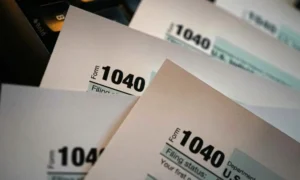You definitely want to avoid a Tax Audit, however, this can be tough when you’re starting your first side gig!
Are you opening a new holistic essential oil skincare consultancy or Young Living business to earn some extra money?
I bet you were super surprised to receive a 1099 for side hobbies? What a drag.
It’s important to know that side hobbies are considered businesses when you receive more than $600 in compensation or make purchases of approximately $5,000.
If you fall into this category, you will receive a 1099-MISC. If you have not received a 1099 in the past, you need to be careful because misinformation abounds on the internet.
Are Side Hobbies The Same As Businesses?

Do you plan to write off losses against other income?
For those with a side business or side hobby, take care and learn the rules. There are differences between a side hobby and a side business.
What Defines a Side Business on Your 1099?
Before classifying your side hobby as a business, keep in mind the hobby loss rule found in Section 183.
If the Internal Revenue Service audits your claimed deductions and finds that your business is, in fact, a side hobby, it could result in an audit with assessed back taxes, interest, and penalties. That’s some scary stuff!
So what exactly makes your business a side hobby and not a business?
The IRS provided a nine-factor test to separate business from a hobby that can make sure your side gig isn’t just a pastime.
1. Record Keeping
Are you keeping accurate records with an eye toward improving year-to-year performance? If so, you might actually be running a business!
Most hobbyists don’t worry about record-keeping, tracking expenses, balancing books, or having multiple bank accounts to separate expenses.
If you’ve been separating out your business and personal expenses or managing your business funds, you’re probably running a side business.
2. Time Commitment
How much of your personal time are you devoting to the activity? If you’re spending more time on your side hobby than you are on other activities, chances are you are running a business.
If you find yourself limiting your “day-job” hours or other commitments in order to spend more time working on your side hobby to make money, your hobby could be a business.
Take a look at how you are managing your time and what your intent behind spending your time on the project is.
3. Profits and Losses
When do you expect to start showing profits? The IRS defines a side business partly by when you expect to start showing profits and income from your business.
“The amount of profits in relation to the amount of losses incurred, and in relation to the amount of the taxpayer’s investment and the value of the assets used in the activity, may provide useful criteria in determining the taxpayer’s intent.”
If a gross income for three or more years exceeds the deductions you can claim, your hobby is classified as a business.
4. Are You Only in it for the Money?
Do you enjoy your side activity – are you only marketing through Facebook and cocktail hours? If you’re in your hobby more for the fun of it than for the money, it’s likely not a business. Think carefully about the intent behind your hobby.
5. Your Financial Status
Does the side hobby provide you with a more solid financial status? Even if you’re working another job, if your side hobby is bolstering your income and affecting your financial status, it’s likely a business.
If at certain periods during the year your side hobby accounts for most of your income, then it should be treated as a side business.
For example, if you are a teacher and make no income during the summer months but rely solely on your knitting business, your knitting is not a hobby.
6. Your Past Success
Have you successfully set up other side gigs in the past? The IRS looks at your past success with side hobbies generating a profit and uses that to judge whether your hobby is a business.
If this is the third side business you’ve started and used to gain profit, the activity should be classified as a business.
7. What Investments You Made
Did you buy land or equipment that you expect to appreciate in value? If you made significant purchases or investments in your business with the expectation that they would generate profit, your gig is a business.
Keep this in mind when making purchases for a side hobby if you are not planning on turning it into a business.
8. How Much You Know
Are you a local expert on your activity? No? Then your side-line business is actually a hobby. The level of expertise you have on your side job is one aspect that defines whether it is a business or a hobby.
9. Income History
Have you been generating a steady income from your side-line job? Then you’ve got a business going. If your profits are minimal and inconsistent your side-line business should be classified as a hobby.
All of these factors affect whether your side-line pastime should be defined as a business or a hobby, but it’s not a comprehensive guide. Hiring a tax attorney is the surefire way to get your taxes filed correctly.
Reporting Your Side Business

When offsetting losses from a second job against your day job, you need organized books that show your intent to grow the business. Showing losses for several years is indicative of a hobby. There is a serious potential for significant back taxes if you have made a mistake.
If you receive a notice of intent from the IRS regarding an audit of your sideline business or 1099 deductions, consult a tax attorney. Remember the IRS does not contact you out of the blue by phone. Initial correspondence is always through the U.S. mail.
Don’t risk getting into trouble with the IRS because of a 1099 issue – call a tax attorney, and we’ll take care of the rest.

Consult a Tax Professional
Not sure where to start? Contact our office if you’ve got questions about your situation.





